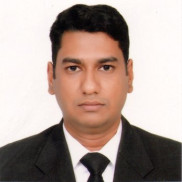Dr. Aroop Saha
Assistant Professor,
Assistant Professor, Department of English
https://orcid.org/0009-0000-4231-1892Personal profile
Biography
Dr. Aroop Saha is working as an Assistant Professor in the Department of English at World University of Bangladesh. Previously, he served at Notre Dame University Bangladesh, Stamford University Bangladesh and BRAC University. He also performed as an adjunct faculty at University of Asia Pacific and Prime University. He has been teaching in the undergraduate and graduate programs of the English Department in Bangladesh since 2007. In his education, he earned his Ph.D. from Jahangirnagar University, as well as his M.A. and B.A. in English from BRAC University. His research areas are indigenous literature, postcolonial literature, postmodern literature, feminism, and cultural studies. He published nine academic articles in The Creative Launcher, MZU Journal of Literature and Cultural Studies, Premier Critical Perspective, IDEAS: International Journal of Literature Arts Science and Culture, Bangladesh University Journal, ASA University Review, and Stamford Journal of English.

